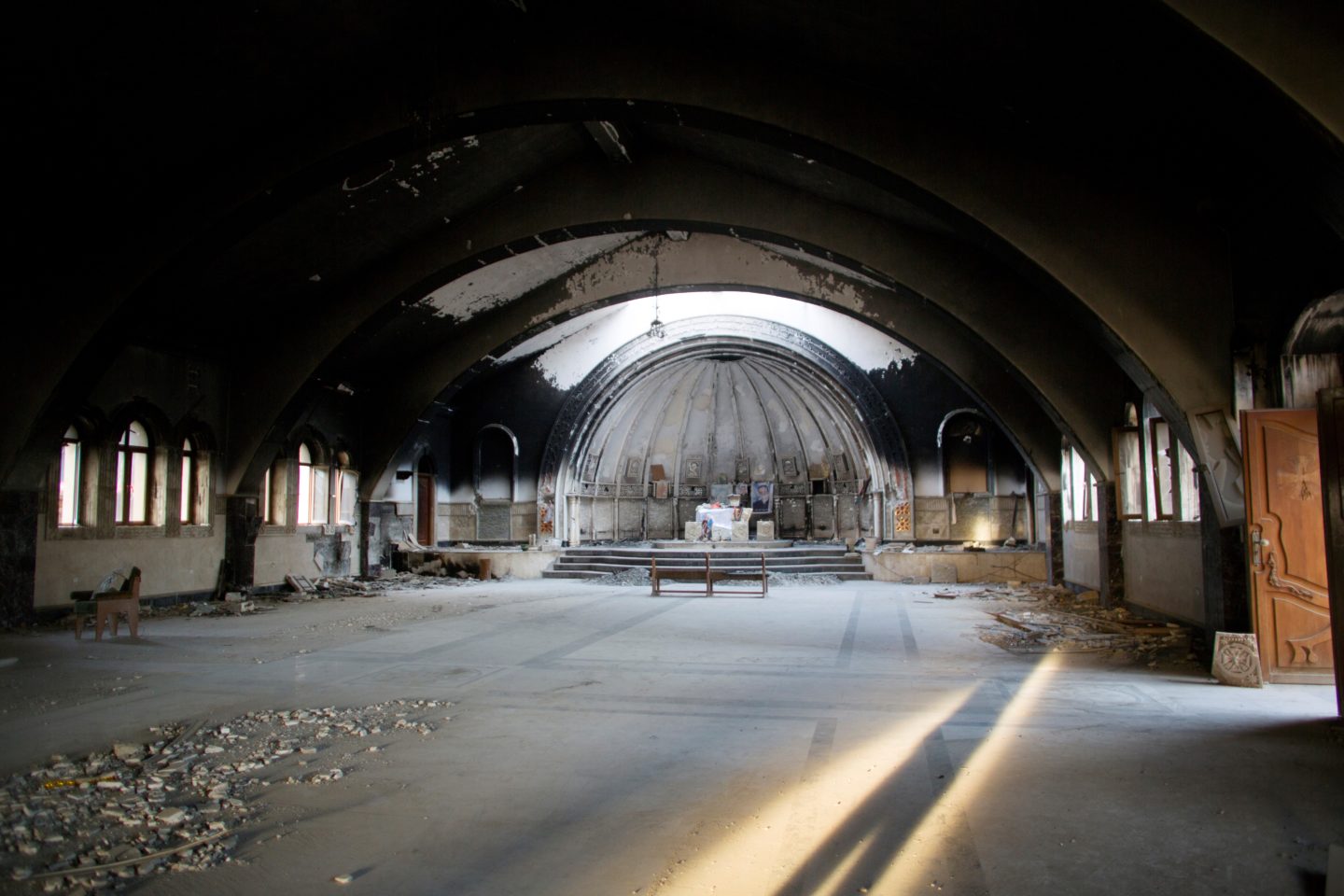As the battle rages between Islamic state group and official forces in Iraq’s second largest city Mosul, a Christian town is preparing for what comes next.
On the outskirts of Mosul lies Al-Hamdaniya, a place almost destroyed by ISIS in 2014. Now a group of residents guard the ruins, patrolling the streets in an attempt to provide security and stop the Islamist fighters from returning.
This small band of men remain so that one day their families and neighbours might be able to return home.
As the militant group advanced into the region in August 2014, the Christians living there began to flee. The women and children left first, followed by the men who had stayed in their homes in the hopes that ISIS would not ultimately invade.
“Four of my sons wanted to stay — they are all engineers. They said, ‘we’re going to stay because maybe ISIS will not come’,” says Behanan Aboush, speaking to The Ferret at the headquarters of the Nineveh Plains Protection Units (NPU) in Al-Hamdaniya.
Aboush is the founder and leader of the NPU, a militia established in early 2015 by Assyrian Christians after ISIS swept across the Ninevah Plains in a lightning offensive where they killed at will and forcibly converted minorities to Islam. An estimated 100,000 Christians fled their homes.
Late one night that August, Aboush received information that the Islamist terror group was on its way, and says he called his sons and told them to flee the town along with anyone else still there.
“I saw the disaster that people were facing at that moment,” Aboush says. “When I saw all this, I started to think, ‘I have to do something, to protect my people — and this area’.”
Some 50,000 people lived in Al-Hamdaniya – the largest Christian town in Iraq – but almost every single resident fled as ISIS advanced. When the fighters entered there were just 35 people still there, according to Aboush.
He says most of them later managed to escape but four people were killed during the occupation while another four people remain missing.
A former soldier with the Iraqi air defense force, Aboush said he established a military force to protect Al-Hamdaniya and other Christian places in the wake of ISIS’s attack. He started with just 15 soldiers but now has around 500 men who’ve been trained by the Americans and armed by Iraqi forces.
“The NPU is a trial to keep our people safe. We are trying our best to protect our people and to help them. We saw what happened to the Yazidis and the big powers didn’t help them. We felt the pain of the Yazidis,” says Aboush.
The town was liberated on October 21 2016, more than two years after ISIS took control. When we visited the town recently, nobody had yet been able to return to their homes. Much of the town was destroyed – some 75 percent of buildings were burned down – before the terror group retreated to Mosul. It will cost millions of dollars to rebuild, a reconstruction process that could take years to complete.
Al-Hamdaniya is a ghost town, eerily deserted. After meeting with Aboush, The Ferret was given a tour by NPU fighters who are paid $400 a month by the Iraqi government. These are ordinary men who once worked in factories and ran small businesses but who now patrol the locality with a license to kill.
The damage wreaked by ISIS is plain to see. Enacting a scorched earth policy ahead of retreat, there was wanton vandalism by the Islamists who targeted almost every home. They also burned and vandalised the ancient Syriac Catholic Church of Mar Behnam, desecrating its altar and destroying its bell tower.
There is black graffiti sprayed everywhere. ISIS marked Christian houses with the Arabic equivalent of the letter “N” to denote the derogatory term ‘Nazarene.’
The NPU gesture to a look-out post armed with a heavy machine gun made in Russia called a ‘Dushka.’ About 100 yards away, there’s a huge trench that the NPU dug around the periphery of the town for protection, in case the terror group returns.
“Our training lasted six months,” says Amar Yashuh who was a policeman in the town. His home was completely destroyed, as was the house of another soldier called Saddam, who says that his wife and four children are living in the Kurdish city of Erbil.
He takes us to a house that ISIS fighters inhabited during their occupation. Inside, there are blankets and sleeping bags used by the Islamists. There’s a bottle of shampoo, a pair of denim shorts and an empty carton of Gauloise cigarettes. On the ground lies a mobile phone that’s been smashed, while a dirty white vest hangs from a door.
The soldiers are unsure what the future holds for the NPU and town of Al-Hamdaniya. They just want a return to peaceful normality but once Mosul is liberated from ISIS there could be tensions between the Kurds and Iraqis over disputed land – including areas of the Ninevah Plains. Back at NPU’s headquarters, Aboush says it should be for the people to decide.
“I would like people (the town’s residents) to have a vote on their future – whether they want to be part of Iraq or part of land controlled by the Kurdistan Regional Government – and for people to respect that vote,” he says. “Most of all, we want to keep our security in our hands.”














